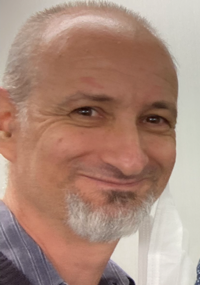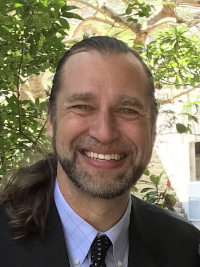What is eJuku?
eJuku is an online skill-building program, in which participants translate the same short text, post their translations to a private online forum, and engage in peer-to-peer discussion about the translations in addition to receiving feedback from veteran translators who are native speakers of the target language and checkers who are native speakers of the source language, all over the course of one or two months.
If you wish to participate in the next session, please send an email to eJuku Committee.
Testimonials:
You can’t get opportunities like this anywhere else... it is enormously valuable for newbies.
It's been a remarkable experience for me.
eJuku has been a truly eye-opening and educational experience for me, and I also enjoyed it very much.
I joined JAT without knowing that such learning opportunities existed, and it made me very glad that I did join.
Coordinator and Mentor:
Richard Sadowsky

Mentor:

Shu Yamakawa
An Overview of JAT’s eJuku Program
1. History
JAT (Japan Association of Translators) is committed to catering to the needs of its membership. One of the most frequent requests is for JAT to offer translator training programs. In addition to the regular monthly meetings and IJET (International Japanese-English Translation) and other conferences, which offer a variety of training opportunities for practicing translators, JAT launched a program in 2009 specifically designed to give novice translators hands-on introductory training in the art of translation. JAT officers who worked on this program in its initial years, including Fred Uleman, Helen Iwata, and Jeremy Whipple, gave it the moniker 'eJuku'.
As of this writing, 17 sessions have been held with 124 participants in total, as shown below. Nos. 2 and 7 were E-to-J sessions. Nos. 5 and 12 had two back-to-back sessions.
===============================
Past eJuku sessions at a glance
===============================
( ) indicates the number of participants
No.1 J>E 1 October 2009 (3)
No.2 E>J 1 January 2010 (3)
No.3 J>E 2 February 2010 (3)
No. 4 J>E 3 November 2011 (3)
No. 5 J>E 4 April 2012 (5)(4)
No. 6 J>E 5 October 2012 (8)
No. 7 E>J 2 August 2013 (5)
No. 8 J>E 6 September 2013 (5)
No. 9 J>E 7 September 2014 (8)
No. 10 J>E 8 March 2015 (7)
No. 11 J>E 9 February 2016 (7)
No. 12 J>E 10 April 2017 (8)(9)
No. 13 J>E 11 March 2018 (8)
No. 14 J>E 12 March 2019 (6)
No. 15 J>E 13 April 2020 (9)
No. 16 J>E 14 April 2021 (9)
No. 17 J>E 13 April 2022 (14)
No. 18 J>E 22 April 2023 (7)
The current eJuku mentoring team is composed of three veteran wordsmiths: David Ulvog, Richard Sadowsky, and Shu Yamakawa.
2. Format
When it was first started, eJuku was strictly a document-based training workshop. The participants translated the source text into English and emailed their work to the checker for review in terms of source text comprehension. The students then submitted their revised drafts to the mentors for their comments from the viewpoint of translation. Based on the mentors' feedback, they could choose to finalize their translation. Questions and answers between the mentors and participants were limited in volume and depth.
The next team followed basically the same approach when it first took over from the program's predecessors in 2011. The session went very well, but the team nevertheless felt a keen need for greater interaction between the participants and mentors, as well as among the participants themselves. The format underwent some changes:
- The participants are given the opportunity to learn what translation is all about in a heuristic manner through peer-to-peer discussion with occasional help coming from the mentors.
- To ensure private, open-minded, and candid exchanges of opinion, a closed discussion forum was provisioned in JAT's Basecamp communication system.
- For enhancing the interpersonal aspect of the program, videoconferences were held and expanded in number. (Today we use Zoom.)
--------------------------------------------------------------------
Spring 2024 schedule
Start of April: eJuku publicly announced; Call for Participants sent to inquirers
Call closed within 7 to 10 days
Applicants screened; participants selected and notified
Forum set up on Basecamp, session begins
Sat., April 20: Zoom Meeting 1 (social/getting-to-know-you)
Wed., April 24: First translations due
Sat., April 27: Zoom Meeting 2
(Sat., May 4: Zoom Meeting 3 ← Golden Week)
Sat., May 11: Zoom Meeting 4
Sat., May 18: Zoom Meeting 5 (wrap-up)
-------------------------------------------------------------------
At the start of the discussion period, one of the mentors creates and uploads an Excel file dividing the source text into sentences or other sensible sections, containing the participants’ translations for each section so that participants have access to each other’s attempts from the first day of discussion. During the forum discussion period, the team members — the three mentors plus the checker — access the forum regularly but try to allow the participants to discuss their translations amongst themselves. They will also join in to share their thoughts in the message board discussion, as deemed appropriate, making necessary comments to assure lively discussions among the participants. The participants not only learn from each other, but soon see the solutions provided by the more experienced translators. This methodology allows participants to analyze everything and develop the skill to translate on their own, discovering that there can often be many "correct" solutions.
The source texts used in a typical J>E session are often general, non-technical passages chosen by one of the mentors from real-world situations. The 2023 session will feature multiple passages to submit week by week, offering a chance for participants to apply what they learn as they go along.
During the entire period of an eJuku session, the participants can ask the mentors any career-related questions, as well as any general translation questions which are not directly related to the source text. The real-time video conferences are an ideal venue for this kind of conversation.
As a matter of principle, eJuku is free, with participants contributing their time and enthusiasm. The only other requirement is that they join JAT if they are not already members.
3. Outcome
Toward the end of each session, the coordinator distributes a questionnaire to get feedback from the participants. On a scale of 1 to 7, with 7 being the best, the session regularly receives 6s and 7s. The JAT website page on eJuku includes a few of these favorable testimonials. Although the organizers are always looking for ways to improve eJuku, participants often agree that it was an excellent learning experience.
It takes a long time for a novice translator to become a seasoned practitioner. Former participants often develop lucrative careers and become active JAT members, serving on various committees.
4. Next eJuku session
Applications for the Spring 2024 eJuku session are being accepted until Sunday, April 14, 2024, 11:59 p.m., Japan Standard Time.
Eligibility requirements for participation in the J-to-E eJuku session are:
1. JAT membership (non-members are required to join JAT if selected to participate)
2. Native or near-native English proficiency (eJuku requires already superb English)
3. Ideally no more than a couple of years' experience as a professional translator
4. High motivation to learn and a commitment to participate actively in written discussions